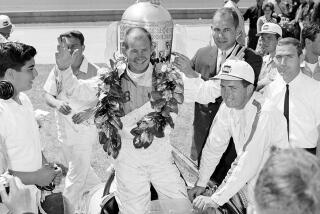De Ferran’s Luck Takes Turn for Worse
- Share via
In auto racing, perhaps more than in many other endeavors, the predictable becomes the unpredictable in the turn of a wheel.
Consider Sunday’s Toyota Grand Prix of Long Beach:
--Brazilian Gil de Ferran, fastest all weekend, the pole-sitter in his Honda-powered Reynard, was clearly the class of the field, running, as he was, eight seconds ahead of it, as he had been doing most of the afternoon.
Obvious conclusion: De Ferran was on his way to his second Indy car victory.
--Al Unser Jr., the king of Long Beach with his six victories here since 1988, was wondering where he had left his title. After a weekend of struggling, which resulted in a starting spot in the fifth row for him and his Penske-Mercedes, he was running behind a lot of drivers and passing few of them.
Obvious conclusion: Little Al was not going to win this race, and would be lucky to finish in the top five.
But then, what is predictable?
De Ferran not only didn’t win the race, he was lucky to finish in the top five.
Unser didn’t win, either, but he stayed out of trouble, got the most out of what his car had to offer and, in a drive perhaps as impressive as any of his victories here, finished third.
“Winning is the only thing, but I’m very proud to be up on the podium [reserved for the top three finishers],” he said. “We’ve been fighting to get here all weekend. . . . I’m pretty happy with the way things went.”
De Ferran couldn’t say much of anything for a long while because he was busy regaining his composure. In the finest, or cruelest, traditions of racing, his victory had vanished with the end in sight.
There he was with his impressive lead on lap 101 of the 105-lap race. And then there he was on lap 102, suddenly back in third place and struggling to make it to the finish.
As a teary de Ferran put it, “It was a sudden problem in the engine. Everything was running so smoothly and then . . .”
The sudden problem turned out to be a loose hose clamp on the car’s turbocharger. And since the turbocharger accounts for significant horsepower in Indy cars--or any cars so equipped--de Ferran went from lots to little in the turn of a wheel.
“This beats everything,” de Ferran said later of his ill luck, compared to other racing surprises he has experienced.
“This was one of those weekends when everything goes right. It was such a good car. The race, we were doing what we wanted to do. The rhythm was hard and fast-paced but I was having no problems. With 10 laps to go, I had eight seconds. I was just trying to control my distance [between him and eventual winner Jimmy Vasser] till the end.
“There was no warning. Just a couple of pops and then pfft. I tried what I could in the cockpit to solve the problem but it was unsolvable. Then I decided to just try to finish the race and get as many [series] points as I could. It was really only when I crossed the [start-finish line] that I let loose. I let the emotion flow a little.”
If anyone was as astonished as de Ferran at the sudden turn of events, it was Vasser.
“I knew I couldn’t catch Gil unless he had a problem ‘cause we didn’t have the car he did,” he said. “It was quite a surprise with three laps to go to see the yellow car going slow.”
Vasser, naturally, made the most of his suddenly improved situation, as did Unser, who even at that point had passed few cars but had been hanging in, hoping for such an opportunity.
“We ran consistent and didn’t make any mistakes,” he said. “And the guys who did, we took advantage of ‘em.”
So did de Ferran, and his driving should have won the race for him.
“You’ve got to race to the checkered flag,” said Jim Hall, de Ferran’s car owner and a former driver of some note.
And that may be the only real predictable thing about racing.
More to Read
Go beyond the scoreboard
Get the latest on L.A.'s teams in the daily Sports Report newsletter.
You may occasionally receive promotional content from the Los Angeles Times.










